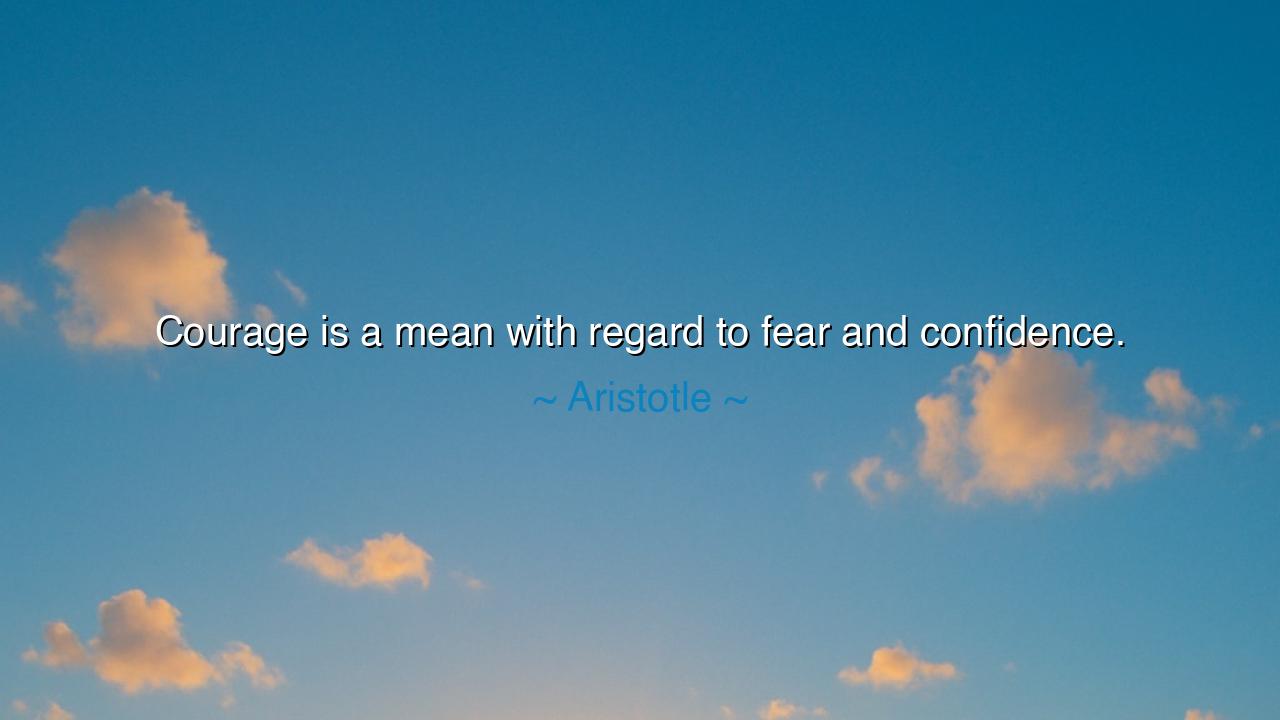
Courage is a mean with regard to fear and confidence.






“Courage is a mean with regard to fear and confidence.” Thus taught Aristotle, the philosopher of balance, whose wisdom still burns like a steady flame through the ages. In this simple yet profound statement, he reveals the essence of virtue — that courage lies not in recklessness nor in cowardice, but in the sacred middle path between them. It is neither the blind confidence that rushes into danger without thought nor the paralyzing fear that flees from every challenge. True courage, he says, is the perfect harmony between these two forces — the state of a soul that feels fear, but masters it; that possesses confidence, but tempers it with wisdom.
The origin of this teaching comes from Aristotle’s great work, the Nicomachean Ethics, wherein he sought to understand the nature of the good life — not a life of excess or deprivation, but one of balance and virtue. To him, every moral quality existed between two extremes: generosity between waste and greed, temperance between indulgence and apathy, and courage between fear and reckless confidence. For the philosopher, the virtuous man is not the one who feels no fear, but the one who feels it rightly and acts despite it. Thus, courage becomes not the absence of emotion, but the mastery of it — the power to align one’s heart with reason and purpose, even when the storm of terror howls within.
To understand this, imagine a soldier upon the battlefield. One man trembles and refuses to fight, overwhelmed by fear; another charges headlong into the fray without thought, consumed by confidence that blinds him to peril. Both, Aristotle would say, err in opposite directions. The first is enslaved by fear; the second, by arrogance. But the true warrior — the one who embodies courage — stands firm, feeling the same terror as his brothers, yet choosing to act with measured strength. He does not run from danger, nor does he seek it; he simply does what must be done, neither overestimating himself nor surrendering to despair. That is the mean — the noble balance of soul that Aristotle called the mark of virtue.
History gives us a living example of this in Leonidas of Sparta, who stood with his three hundred at the gates of Thermopylae. He did not rush into battle recklessly, seeking glory for its own sake; nor did he retreat before the might of Persia. He understood the weight of death and the fear of it — yet his courage lay in standing his ground with calm resolve, choosing duty over survival. Leonidas was not fearless; he was measured, deliberate, resolute. In him, fear and confidence were held in equilibrium, balanced by wisdom. His death was not reckless destruction but a conscious offering, made in harmony with his soul and his purpose.
Aristotle’s wisdom reminds us that the extremes of life — too much or too little — are both paths of ruin. Fear, when unchecked, shrinks the spirit and chains the will; confidence, when unbridled, blinds the mind and invites destruction. But the courageous heart — that is the heart that has learned to listen to both, to use fear as a warning and confidence as a guide. Such a heart does not deny its trembling; it steadies it. It does not silence its doubts; it directs them toward truth. In this balance lies all greatness — for from courage, all other virtues are made possible.
Even in the quiet battles of daily life, this teaching endures. The one who speaks the truth when it is unpopular, who stands for justice amid ridicule, who endures pain without surrendering to bitterness — such a person lives Aristotle’s wisdom. Courage is not reserved for warriors or kings; it belongs to every soul who faces fear and refuses to be conquered by it. When we are tempted to despair, courage restores our balance. When pride tempts us to arrogance, courage humbles us with awareness of our limits. It is the still center between trembling and recklessness — the measure of a soul at peace with both its vulnerability and its strength.
Therefore, my children, let this truth be written upon your hearts: “Courage is a mean with regard to fear and confidence.” When fear comes, do not deny it — master it. When confidence rises, do not let it swell into pride — guide it. Seek always the middle way, for in that balance lies both serenity and power. Stand firm in the face of life’s storms, not as one who feels nothing, but as one who feels deeply and yet chooses rightly. For courage is not the roar of the fearless, nor the silence of the coward — it is the calm voice that says, “I will act, and I will endure.”
And so, remember: courage is the heartbeat of virtue, the bridge between fear and confidence. Walk that bridge with wisdom, and your life will not be ruled by chaos, but by harmony. You will find, in the quiet equilibrium of your spirit, the truest kind of strength — the strength to live nobly, to act rightly, and to face whatever comes with dignity and grace.






AAdministratorAdministrator
Welcome, honored guests. Please leave a comment, we will respond soon